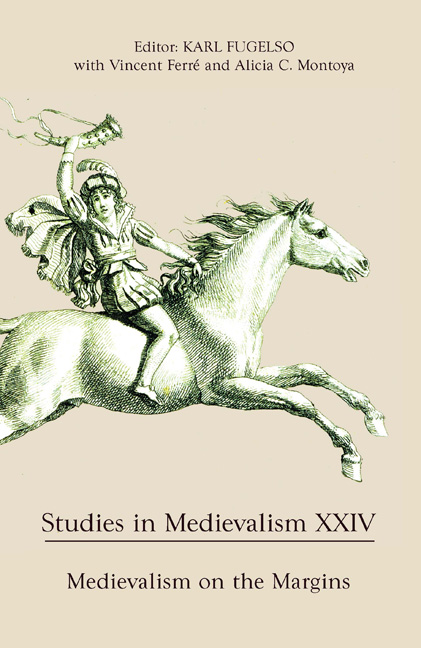Book contents
- Frontmatter
- Acknowledgments
- Contents
- List of Illustrations
- Volume XXIV 2015
- Editorial Note
- I Medievalism on the Margins: Some Perspective(s)
- II Trans-Atlantic Medievalism(s)
- 9 Speaking of the Middle Ages Today: European and Transatlantic Perspectives
- 10 Echoes from the Middle Ages: Tales of Chivalry, Romances, and Nation-building in Spain (1750–1850)
- 11 Antiquarianism over Presentism: Reflections on Spanish Medieval Studies
- 12 Medievalism and the Contemporaneity of the Medieval in Postcolonial Brazil
- III Other Interpretations
- Contributors
9 - Speaking of the Middle Ages Today: European and Transatlantic Perspectives
from II - Trans-Atlantic Medievalism(s)
Published online by Cambridge University Press: 05 December 2015
- Frontmatter
- Acknowledgments
- Contents
- List of Illustrations
- Volume XXIV 2015
- Editorial Note
- I Medievalism on the Margins: Some Perspective(s)
- II Trans-Atlantic Medievalism(s)
- 9 Speaking of the Middle Ages Today: European and Transatlantic Perspectives
- 10 Echoes from the Middle Ages: Tales of Chivalry, Romances, and Nation-building in Spain (1750–1850)
- 11 Antiquarianism over Presentism: Reflections on Spanish Medieval Studies
- 12 Medievalism and the Contemporaneity of the Medieval in Postcolonial Brazil
- III Other Interpretations
- Contributors
Summary
This section of the book originated as a response to several recent developments within the field of medievalism studies. These included, as its most direct catalyst, a conference we organized in July 2010 on “Transatlantic Dialogues/Speaking of the Middle Ages,” at the joint initiative of the U.S.- based group of scholars around the journal Studies in Medievalism and the French-based association Modernités médiévales; the three articles included here are based on papers first presented at that conference – as is Jeff Rider's essay, “The Middle Ages Are within Your Grasp: Motor Neurons, Mirror Neurons, Simulacra, and Imagining the Past.”
The original conference, as well as this section and the simultaneously published volume of the RELIEF journal on French medievalism, aimed at engaging in a dialogue between continental European and Anglo-American traditions of medievalist scholarship. While the Middle Ages we refer to today are European, it appeared that it was Anglo-American scholarship in particular that was developing new ways of conceptualizing this era as the object of a distinct field of medievalism studies, dealing not with “the Middle Ages” but with the imaginative recreation of the medieval past in ensuing periods.
Modern medievalism has tended to have a strong Anglo-American focus, overwhelmingly privileging the study of examples drawn from the Anglo- American world and from English-language arts and literature in particular; medievalist phenomena from other geographic areas subsequently did not receive nearly the amount of attention they might seem to deserve.
This existence of nationally distinct approaches to the medieval certainly seemed to invite further questioning. Papers presented at the 2010 conference illustrate how the dominant Anglo-American paradigm of medievalism studies could be enriched by drawing on insights from other geographical and cultural contexts, not only the French tradition – as the RELIEF issue shows – but also the often underappreciated richness of Hispanic and Luso- phone engagements with the medieval, ranging from the ideologically motivated defenses of the medieval elaborated by Spanish historians exiled in South America during the Franco years, to postcolonial Brazilian “medievalizations” of the country's own geographical peripheries.
- Type
- Chapter
- Information
- Studies in Medievalism XXIVMedievalism on the Margins, pp. 89 - 92Publisher: Boydell & BrewerPrint publication year: 2015



